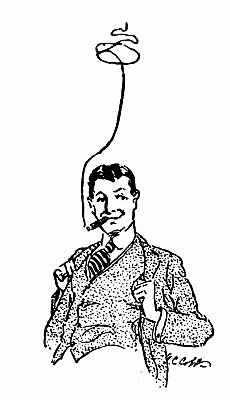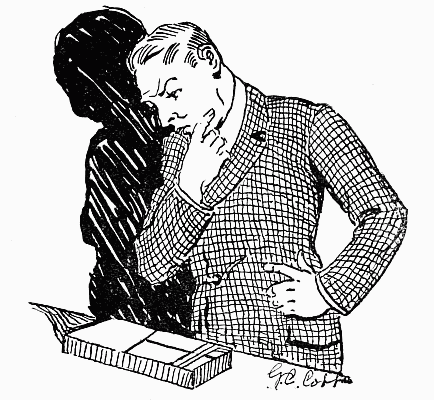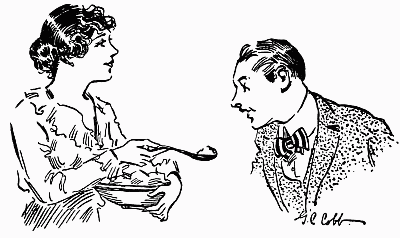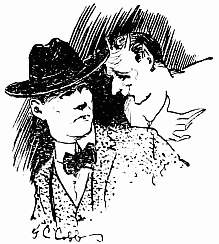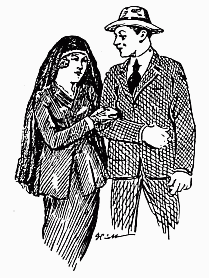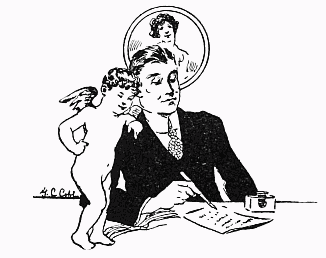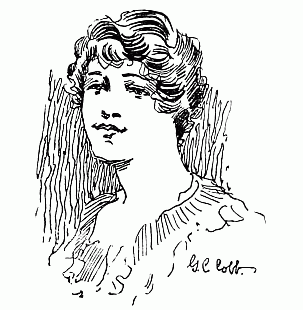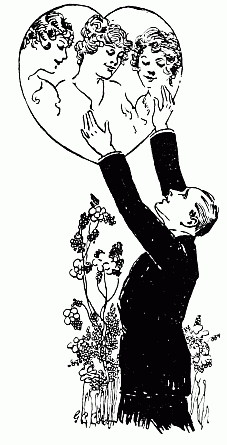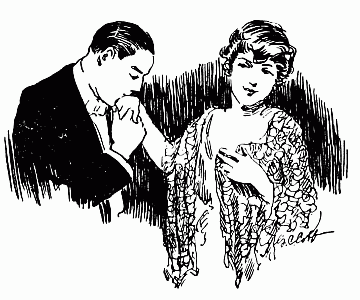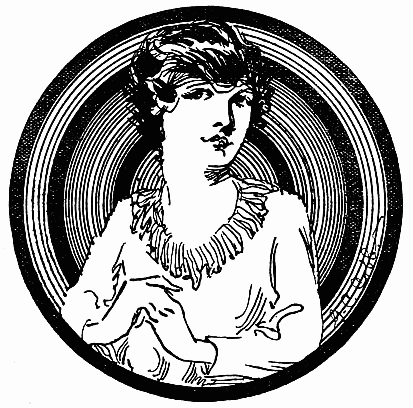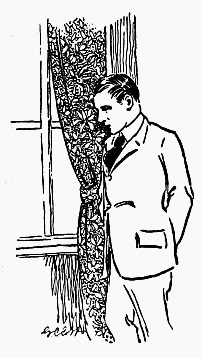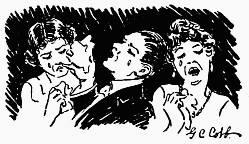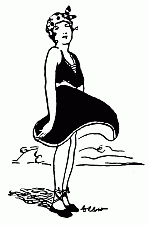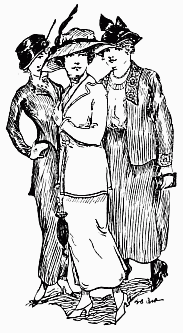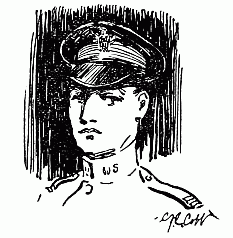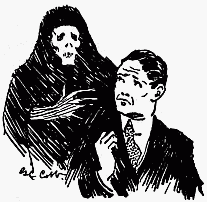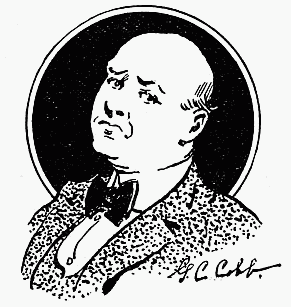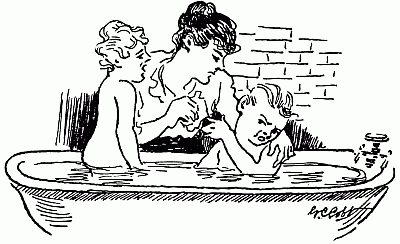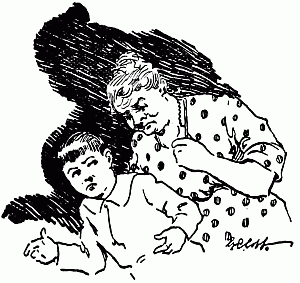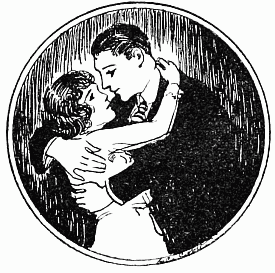*** START OF THE PROJECT GUTENBERG EBOOK 42392 ***
The Jumble Book of Rhymes
Recited by the Jumbler
The Jumble Book of Rhymes
Recited by The Jumbler
——————
By FRANK R. HEINE.
Illustrations by G. C. Cobb.
Cover Design by Jack Cooley.
——————
Hackney & Moale Company, Publishers.
Asheville, North Carolina.
Price $1.00 Net.
——————
Copyright, June, 1919.
By Frank R. Heine.
"Many people read a song
Who will not read a sermon."
Foreword
Pegasus is a queer old nag, and many of his
would-be riders find him most unruly. We mount him
and are off for a wee nip of Hippocrene. We want
him to lazy along like a plough horse, while we pluck
daisies, but he insists on demonstrating that, like a
Hambletonian, he has all of the High School gaits.
And when we pass the Queen's carriage, expecting him
to step stately and look like a million dollars, the old
plug stumbles and limps, and is classed by all as a casual.
So please, please blame the horse—and not the
rider.

Dedication
To the boys who have found the old War Horse
a dangerous animal, have come to cropper in the Big
Muss, and are now assigned to bunk fatigue, we offer
these rhymes. Though, they are crippled; and limp,
and halt, and stumble at times—yet we trust they may,
for all that, break through when General Monotony is
entertaining a company of Blue Devils, and for a few
moments, at least, put to rout serious and somber
thoughts.
To the casuals now enjoying hospital hospitality
at Kenilworth (Biltmore) and Oteen (Azalea), this
jumble of rhymes is dedicated.
Pick it up, Buddy, it's a dud.
—F. R. H.
[9]
THE JUMBLE BOOK OF RHYMES
Greetings
A New Year Greeting in which the Jumbler hopes to meet
you soon.
My wish most dear for your New Year
I'm quite sincere in giving;
When next we meet, on Easy Street
I hope that you'll be living.
P. S.—And I hope I meet you soon.
[10]
Introspection
The old nag, Pegasus, invites the Jumbler to an introspective
mood as he lopes along. It is Thanksgiving, 1917.
Am I thankful?
Let-me-see—
World, Flesh, Devil
Good to me;
Friends still loyal,
Coin in banks—
Stop this minute!
I'll give thanks.
What of troubles
Lately past?
Well, at least they
Didn't last.
Not a single
Scar remains,
Nor remembrance
Of the pains.
So, I'm thinking
That from me
There is due great
Gobs of glee.
Though a slacker,
From this day
I'll be grateful—
Let us Pray!
[11]
An Acknowledgment
(From Him to Her).
The receipt of a gift he cannot label leads the Jumbler to recite:
I thank you for the hickeydee,
The thingamabob you sent;
The trickamadoo's the very thing
On which my heart was bent.
The dofunny's style and color
Puts all dodads to shame;
The jiggermaree's the swellest thing
That ever bore that name.
Appreciation's most sincere,
But I'll no longer lie—
Pray be a sport and tell me quick:
What is the thing?—and why?
[12]
Pay! Pay!! Pay!!!
In which the Jumbler notes the profusion and the pertinacity of
the Pauls and the pitiful paucity of Peters.
I'm daily robbing Peter for to pay Old Mr. Paul;
I swear it's hard them both to satisfy;
Pauls in legions me pursue, but the Peters are so few—
I lie awake at night and wonder why.
The hope of every Peter is some day to be a Paul.
Then little Peters must be set to sprout.
Ev'ry chance of Paul for pay would forever pass away
The day the tribe of Peter petered out.
[13]
Taffy and the Man
As a member of the Taffy Consumers' League, the Jumbler
offers this bit of defence:
I have eaten grits and gravy in the Southland now and then,
I have lived on California's luscious fruits;
I've inhaled long-stringed spaghetti in Italia, and again
In the Klondike once I dined on cowhide boots.
Of course I've supped at Rector's, at the Cecil, and the rest;
Tackled truffles and de foie gras in Paree;
I have bolted guava jelly and tortillas, Madrid's best,
And I've chop-sticked bird's-nest soup a la Chinee.
But of all the palate-ticklers on the whole world's bill of fare,
Whether ladled out at morning, night or noon,
Not a gustatory stimulant that I know can compare
With a little dab of taffy on a spoon.
[14]
If a man is grouched or peevish, if in doling cash he's slow—
Just a little bit of taffy—presto! won!!
Every married woman knows it—every girlie ought to know:
If you feed a man of taffy he's undone.
When a man tries introspection, then he stacks up mighty small;
So he keeps from this self-searching all he can;
Yet a feeling lies inherent, never's lost in him at all,
That he'd like to be a bigger, better man.
So when other people tell him that he's bigger, nicer far,
Or a better chap than he himself can see,
There is worked a transformation and his stock goes way 'bove par,
And he feels the man he'd really like to be.
It's not Vanity that does it, but his Better Self you view
As he smiles and purrs and pleases all he can.
As a corking good investment I would hand this tip to you:
Just try always feeding taffy to a man.
Do not stinge nor be too saving, don't conserve this priceless boon,
But feed as though you had an endless store;
With an appetite voracious he will gulp it from the spoon,
And when all's gone he'll loudly cry for more.

[15]
Myself vs. Me
Some serious thoughts on the psychology of Respectability.
My life is one long battle,
Between Myself and Me;
I see the right, yet do the wrong—
This much too frequently.
I have the foolish habit,
That oft brings me disgrace,
Of cutting off my Roman nose
To spite my ugly face.
I'm daily robbing Peter
To pay Old Mister Paul—
Though cosmos out of chaos
It never makes at all.
I jump out of the skillet
Into the fire that's hot;
With fingers burned I dread the blaze.
But quit it? I guess not!
And so goes on the battle
Between Myself and Me—
Old Satan pulling fiercely 'gainst
Respectability?
[16]
To "The Quiet Observer"
An appreciation—wherein the Jumbler indites the following to
the space writer who quotes from him and Riley.
I sat me down in pride to gloat
Upon the column that you wrote,
In which you, sir, were pleased to quote
From me and Riley—
From me and him,
From me and Jim,
From me and Riley.
The
tout ensemble did impel
My manly chest to heave and swell;
The combination "liked me well;"
Me, you and Riley.
It seemed a great
Triumvirate—
Me, You and Riley.
But soon in deep humility
My head was bowed, and I could see
The difference 'tween little
me
And You and Riley.
I lacked the art
To touch the heart
[17]Like you and Riley.
You seem to write with greatest ease,
Of cheerful mien, of birds and bees,
And out-of-doorsy things one sees—
And so does Riley.
With master-stroke,
To common folk
Write you and Riley.
I take a hack-saw and a square
And cut my rhymes with greatest care;
'Tis harder work for me, I swear,
Than you and Riley.
And yet I fail
To hit the nail
Like you and Riley.
You write in prose—a rhymer he—
And yet 't has always seemed to me
Your souls alike must surely be—
Yours, sir, and Riley's.
You love each thing
Of which you sing—
Do you and Riley.

[18]
A bas Polyanna!
Wherein the Jumbler finds the Cheeruptimistic
Lore a bore.
I hate the Pollyanna cult! Cheeruptimistic lore, that now
confronts at every turn, long since became a bore. In daily
press, in magazines, in every thing I read, the sugar-coated life's
prescribed as man's most urgent need. 'Tis O be joyful, grin
and smile, let tears be left unshed; just purr and sing the
whole day long, then pass it on ahead! If grandma dies or
cook takes leave or father breaks a leg, be glad, be glad; and
if you're broke, why, whistle as you beg! Now I, for one, refuse
to live a grinning Cheshire cat. I'm just as human, mad
as glad—a fool can tell you that. All sunshine makes a desert
waste, and honey-words soon pall; because someone's in harder
luck can't make me glad at all. A man has special muscles
just to corrugate his brow; the Lord knew when he fashioned
them that they'd be used, and how. I want my friends
without veneer, straightforward as can be; and I will grant
them outlet for innate depravity. Why bluff and play that
grief's not real? Why blush to shed a tear? A temper may
be lost and found, with Paradise still near. No need to gloom
or grouch or fret, no need to howl or whine; but may the
right to voice a grief or own a pain be mine.

[19]
If You'd Marry
Advice to wimmin "On Marriage," by the Jumbler.
If the fish won't take your bait,
Do not tarry.
'Twill never do to sit and wait,
If you'd marry.
Gather up your hook and line,
Somewhere 'round the water's fine;
Change your bait and keep on tryin'!
That's the system!
Should one rise in reach of you,
Oh, be prayerful!
Take your gaff and run him through,
But be careful!
Hold him tight for all you're worth,
Of marryin' men there's now a dearth,
And then—there're widows still on earth!!
Curses on 'em!
If a widow steals a beau
That you're landing,
Practice up a knock-out blow—
Him demanding.
A perfect lady, though you've been,
Just you cave her features in!
Killin' widows ain't no sin—
Never will be!
[20]
To My Valentine
The Jumbler, with one eye on the calendar, tells the thoughts
he thinks—claiming immunity the while.
Saint Valentine, that good old gink,
Gives license free to say with ink
The things you feel, the thoughts you think.
So timid youths, of courts afraid,
Select this day to tell a maid
Things otherwise best left unsaid.
This custom all the judges know,
And breach-of-promise suits don't go—
So that's "how comes" what's writ below:
I love you, dear, to beat the Dutch!
I love you, dear, gosh-awful much!
Now could you love, obey—and such?
With love my heart seems 'bout to burst—
But I've now said all that I durst.
With love to all,—John Safety First.
[21]
The Jumbler again mounts Pegasus, and carries us
through the Realm of Dreams, where we come in touch
with the Life Romantic.
The Jumbler recites:
| All Mine in Dreams. |
| Should Dreams Come True. |
| Lotus Eating. |
[22]
All Mine in Dreams
The Jumbler, thinking of "The Little House," also thinks of
a little house-keeper.
O little girl with wondrous eyes
And charms of Graces Three!
"How have you come, why have you come
To mean so much to me?"
Unrest within my heart you've raised—
And yet, how sweet it seems!
My hopes, My dear, this much I know:
You're mine, all mine, in dreams.
O little maid, dear, dearest maid,
Should you be lost to me
Were I to wake and straightway go
And tell my love to thee?
What powers or aid could I invoke?
Alas! dear one, it seems
The risk's too great of losing all—
So mine still stay in dreams.
[23]
Should Dreams Come True
The Jumbler wakes up and credits himself with a big heart.
This man, O girl with charms untold,
Has dreamed of Love and You;
And can it be somewhere's a land
Where these dreams may come true?
Ah, if there be, then willingly
To rainbow's end he'll go,
Or far's the place where seas begin—
For, Girl, he loves you so!
And he, dear one, a king can be—
Yes, by one way alone:
That you, his Queen, through love for him,
Should raise him to your throne.
But whether he be king or serf,
Of this be sure: thou art
A mighty queen, whose realm is wide—
You reign o'er all his heart.
[24]
Lotus Eating
In the land of In-a-minute, the land of Lots-of-time,
The land of What's-the-hurry? Manna-land sublime;
The land of Sleep-a-whole-lot,—to me it ofttimes seems
I sure should like to live there, for I'd have time for Dreams.
(Here the Jumbler becomes personal):
Now I'd not waste a minute if I lived in that clime,
But say good-bye to worry, and dream—well all the time.
And what, dear, do you reckon my fancy'd bring to view?
The answer is so easy: Sweetheart, I'd dream of You.
[25]
Fergit Dem Dreams
Leaving the Realm of Dreams, the Jumbler quotes the advice
of a married friend.
Aw, cut it, kid! Dis lovin' gag
Don't make no hit wid me;
I've went de route and ought ter know—
Fer, ain't I married? Gee!
Dere's nuthin to it, foolish man;
None of 'em's what dey seems,
De game's a bunk, Kid, all way tru—
Wake up, fergit dem dreams!
[28]
[26]
[27]
Most earnestly the Jumbler presents his views on Serious
Matters pertaining to Love and Life.
| Fickleness of Maidens. |
| Constancy—As Applied to One Man. |
| The One and The Only. |
| Handle With Care. |
| My Garden. |
| My Threnody. |
| Eternity. |
Fickleness of Maidens
"Good-bye," I said to Mary,
To Margie, Maud and May;
And I put them from me harshly
And turned myself away.
For my all in all was Maizie—
I swore it on that day.
But time came when my spirit
Grew weary of its pace,
And I cried, "Come back, dear ex-ones,
I'm sick of just one face!"
But they replied, "We cannot,
Another has your place."
(After Dunbar)
[29]
Constancy—As Applied to One Man
A man by Nature ne'er was meant
To love one maid alone—
E'en if by doing so he'd gain
A seat upon a throne.
Polygamous when 'comes to love—
(Be diff'rent no man can)
Monogony's monotony
When 'plied to love of man!
Yet here am I! ('gainst Nature's law)—
Mirabile dictu—
Loving one maid, and just ONE (sic),
Exclusively and true!
As other men, I liv'd and lov'd
Until you came my way—
Now all my love is yours, O Queen,
Forever and a day!
Dear, dear dead loves, one last farewell!
Your graves no more I'll tend;
Your ghosts, whom I have welcomed oft,
Their visits now must end.
Sweet girls, whom I have lov'd—and lost—
Loved? Yes, but for a day—
I now have found my Queen of Hearts
Whom I can love alway.
I once thought that I lov'd you well—
But O! the love I feel
For my dear Queen is diff'rent quite—
And it's the love that's real.
My Queen now has each thought, each dream;
No more I'll think of you—
Love was, love's past for all save her—
So, ex-loves all, adieu.
[30]
Handle With Care
The tangible always is frangible.
(Proven long since, I take it).
By chance or by art you've taken hold of my heart—
But please, Little Girl, don't break it!
[31]
The One and The Only
Hundreds of maids in this world have been born
With many a charm that allures, dear;
Hundreds are radiant, fair as the morn—
But never were eyes just like yours dear.
Hundreds boast beauty of form and of face,
Which always devotion assures, dear;
Hundreds personification of grace,
But none has a smile just like yours, dear.
[32]
Hundreds accomplished in letters and song,
And hundreds attractive and clever;
Daily I walk through this limitless throng,
Yet find none compares with you—ever.
If from these hundreds an artist should mould
A composite maid, near perfection;
Stand her beside you, to choose I be told—
My dear, can't you guess my selection?
Hundreds and millions of maids there may be,
And yet, without you I'd be lonely.
Pray be convinced, for I speak truthfully:
Dear, you are the One and the Only.
[33]
My Garden
I wander into my garden,
My garden of loves that are dead,
And stop at a withered rose bush
That once grew a blossom of red.
How passionately, true I loved it,
Thought without it I could not abide—
How bitter it is to remember
In a night it had withered and died.
The violet that grew on the hillside
I loved with a love that was true;
But 'twas snatched from me e'en as I held it—
O, Violet, dear, how I loved you!
And dearest of all, the sweet June Rose,
As a bud she'd come out first that year;
But I lost her just as I'd plucked her—
The heartless and pitiless dear!
The lily and pink that I worshipped
Each deigned but a season to stay,
And returned not again though I waited
[34]And longed for them many a day.
Dear loves that are dead, hear me say it:
A loving good-bye to you all!
No more shall I visit this garden,
For my true love grows just o'er the wall.
Having loved you has made my love stronger
For her whom I now so adore;
I'd truly not know how to love her
Had I not loved you-all before.
Good-bye, then, again, fairest garden;
Good-bye to you all, fickle dears;
Dear Rosemary, last, fondest treasure,
Will be faithful to me through the years.

[35]
My Threnody
The Weatherman's in direst straits;
All wrong are his predictions;
Not Bright and Fair, but Drear and Cold—
And so his maledictions.
Now I can give the answer to
This scientific gent:
'Tis not from meteoric change—
But just 'cause She has went.
I've read by hundreds love-stuff books,
But ne'er believed one bit
When sun was made to cease to shine
When "She" made her exit.
But now I know that they were right;
From Sol no rays are sent;
It's dull and gray and dismal quite—
And all 'cause She has went.
I cannot read, nor write, nor think
Since She has went, Oh, dear!
Of compensation, though, there's heaps:
For, well, she once was here!
So I'll not mind the fierce heart pain
That naught seems to allay.
She's went, ah me! but I shall hope
That she'll come back some day.
[36]
Eternity
She's coming—
The woman I loved and lost!
Widowed at last and once more free.
One hand, two, or arms? Ah, me!
Our meeting, her greeting—....
O what will it be?
She's coming—
The woman I loved—and love!
Long have I waited so hopelessly;
One year, all—yet faithfully.
Returning! I'm yearning....
Be kind, gods, to me!
Yes, coming!
O woman beloved of all,
Come to arms that still ache so for thee!
One age, two, Eternity
For loving, for Loving
Awaits you and me.
[37]
INTERMISSION
[38]
A MEDLEY
(Rendered by the Jumbler during the Intermission).
[39]
I 'Ear Noes
The Jumbler turns some anatomical terms.
The night has a thousand eyes,
The day to one lays claim;
The big brown pair that you, dear, wear
Sure puts them all to shame.
It seems 'bout a thousand years
My heart you've trod in dust;
But lend an ear and listen, dear:
The end of waste is bust.
Though I've heard a thousand noes—
As someone knows is true—
An aye once said, we'll soon be wed,
Or I'll be ever blue.
Ode to a Sylphine Figure
Thinner yet and thinner—
I would be like thee.
I am nearly drowned in
Perspiration's sea.
From my adiposeness
I'd be set clear free—
Though it means my joining
Broomstick cavalry.
Feelin' Blue
My nose is red,
I'm feeling blue!
If you had bawled
I guess so'd you ... be feelin' blue.
BECAUSE I Have Just Run Into a Nest of Crying Women.
I went to a Niobe party,
Where all were expected to bawl;
There were peachy repiners and whiners in minors—
Your "Uncle" wailed loudest of all.
A Bare Story
Nobody loves a man that's bald,
I've often heard it said;
But why does Love, then, laugh at locks?—
It makes me scratch my head.
[40]
A Truth
A simple truth I give to you
To always recollect;
There is one thing—and that's Friendship—
Will not thrive on neglect.
Hooverize
An order of Hoover's
I think is quite good;
"Don't feed your dear husband—
But husband your food."
Fine
"It must be fine," the Sweet Thing cried,
"To write a poem like his'n."
"It should be fine," the man replied,
"Plus thirty days in prison."
[41]
Fugax, Sequax; Sequax, Fugax
Maids, they say, like shadows are:
(I wonder if it's true).
Follow, and they run away;
Retreat, they follow you!
A Betrayal of Irish Ancestry
If you ask my wish sincerest,
I will quickly make reply:
May you live—yes, live forever—
And be happy till you die.
Exit Cooky
Our queasy queen of the cuisine
A queer, querulous creature has long been;
In her quite quiet way she quickly quit on Sunday—
Quid est? Quid nunc? Why—quondam!
The Limit
Prissy, persnickety people there be,
Fastidious, finical ones, we see;
But the fussiest man in town by far,
Is he who washes his little Ford car.
[42]
Safety First
Propinquity plus
Proximity, plus
A little Encouragement, dear,
And havoc you'd play
With my heart. I'm away
To the umbrageous dingles, through fear.
Unbearable
Three things my nature cannot stand—
I'll name them, if you please:
Temptation and Encouragement;
Neglect's the worst of these.
Wrong Prescription
Tell me, please, sir, Mr. Captain—
It's advice I'm lookin' fer—
Is it true carbolic acid
Is good for cooties, sir?
Are you serious, poor rookie,
Or are you making fun?
What you mention isn't good at all—
It kills 'em every one.
[43]
Seeing Double
"Look twice before you leap, son,"
My mother oft told me.
Each time I take a second look,
A second girl I see.
The only thing that's better—
You'll think me quite a dunce—
Would be to have diplopia,
Then I'd see two at once.
Wisdom
Napoleon was a wise old guy;
A saying of his ran
Like this: "To all who would be safe,
Don't write, just send a man!"
[44]
Just Talk
Following the Intermission the Jumbler unravels the difference
between speech and talk and think and thought.
From time an infant draws first breath
And 'gins its virgin squaking,
Each mother proud, not saving one,
Translates all goos as talking.
This goo means this, a girr means that—
A new word every minute—
It yells! Says pa, "My dear, you're right,
There's surely something in it." (A pin, perhaps).
Milk-Latin talk lasts 'bout a year,
And then, strict truth I'm telling,
A plain "Mam-ma" may strike your ear—
In interim of yelling.
The next few years great strides are made;
Mamma is fair ecstatic,
For now it talks as good as dad—
'Cept 'course, it's not grammatic.
And then comes slang, and cussing, too—
If it's a boy, the latter—
But if a girl, the whole day through
[45]It's giggle, chatter, chatter.
And now it's grown, and still it talks!
But will somebody answer:
How much is said that tends to help
Despondent fellow-man, sir?
And words of comfort, love and cheer
Are all not slow in giving?
Yet it's the joy we scatter here
That makes our lives worth living.
From birth till death it's talk, talk, talk!
But listen, please, and ponder:
What would it mean if speech meant thought?
Who would be dumb, I wonder?
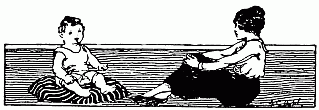

[46]
The Man Who Made Umph-ta-ta Smile
If to Heaven you would go—Smile.
A god once was made and heathen had prayed
To him throughout many a year;
His face was distort with a frown of the sort
That gave them all quakings of fear.
The rulers in line, of whom there'd been nine,
Each published this royal decree:
The man who'll beguile our fierce god to smile
May claim the King's crown as his fee.
From all the world o'er had come by the score
The jester, the fool and the clown;
With quip and with jest had each tried his best,
Yet not one displaced the god's frown.
Joe Miller and Twain had been quoted in vain,
(Each man as he failed was exiled.)
But failures all scored, the god still looked bored,
Then I appeared—and he smiled!
When his visage had cleared, the heathen all cheered
[47]And each wore a smile good to see;
With shouting and song they bore me along
Till straight to the King they'd brought me.
The King then stepped down, said
"Sir, here's my crown,
And gold you shall have by the pile,
But tell me, I pray, just what did you say
That made our god, Umph-ta-ta, smile?"
"Your crown and your pelf, Sire, keep for yourself,"
I said, "but pray listen to me:
I just made the trial—
a smile for a smile—
And succeeded, Good King, as you see.
Of pomp, Noble Sire, and of power I should tire,
And soon think them not worth my while,
Contented I'll be if 't can be said of me:
'He's the man who makes everyone smile'.
"Pray heed me, O King, a smile, Sire is the thing
That will win you a smile in return;
Just try it and see, and I'm sure you'll agree
'Tis a thing that all people should learn.
Your wise pulpiteers may belabor your ears
With all the orthodox doctrines extant,
But if t' Heaven you'd go, then you might as well know
[48]'Nless you smile throughout life—well, you can't!
There's nothing worth while can't be won with a smile—
A maxim you prove when you try—
I must now be gone to pass the word on;
There're others who need it. Good-bye!"
———:———
My story you've heard—well, then, just one word:—
Is anyone now within sight?
Just smile on him, do—why, he's smiling at you!
Your very first test proves I'm right.
[49]
Myself and Me
Unlike George Cohan, the Jumbler doesn't love himself.
'Tis torrid here and all have gone
To seashore on a trot;
I'm left alone, alas! and I'm
The only friend I've got.
I've walked with me and talked with me
Until I'm satiate;
I'm sick and tired and bored with me;
The thought of me I hate.
Divorce I'd have 'tween self and me;
For happiness I'd strike;
We're surely incompatible
'Cause too darned much alike.
[50]
C'est la Guerre
After throwing his friends into fits, the Jumbler decides his
Soldier-French won't go.
There are some folks, alas! I know
Who Fletcherize the calico
And pull out wads of hair
When now and then, as if by chance,
I lapse into the speech of France.
But—blame it on la guerre.
My accent's not Parisian, yet
It's tres bien, so said Lizette—
And surely she should know.
She never frowned and said non, non!
But she would smile and say, "Bon bon!"
Oui, oui, I get you, Bo!
Jolie Jeanne plays the Marseillaise!
I ball myself in many ways
When this I try to say.
But tres, merci, chere, and beaucoup
I say just like the Frenchies do—
Admit it, s'il vous plait.
Yet if each time I parlez vous
These friends must throw a fit or two
And shock their systems so,
I think I'll stick to plain Anglais
And say adieu to all Francais—
My Soldier-French won't go!
[51]
Spring Styles
"Well, you may talk
Of woman's wiles
Of all these lat-
Est skinny styles;
Rave over girls
Built like a slat;
But I must say
I like 'em fat!"
A girl that's fat?
Oh, no, no, No!
No lap, no waist
Nor high nor low;
An oozing mass
When weather's hot—
You like this type?
Well, I do not!
For me, a girl
That's sylph-like made,
Who's just the same
In sun or shade;
And as for me,
And I'm no churl,
Where there's no waist—
[52]Then there's no girl!
No hefty bunch
Of av'rdupois,
No dray-horse girl
Shall share my joys;
But pocket-size,
A featherweight,
Will find me most
Affectionate.
[53]
Strictly Proper
Ol' Miss Propri'ty up an' say:
"Why will you chilluns ack this way?
Whenever I go out to walk
I see you two—an' people talk!
"Miss Grundy says to me today:
'They go to ride, an' stay an' stay.
How come her pa don't take a hand
An' call 'em down to beat the band?'
"I've tol' you time an' time again
A man should call but now and then,
Unless the priest has called the banns
An' date's been set for jinin' han's.
"'Tain't proper, no, an' it ain't right
To call or ride mos' ev'ry night.
Hear now the last word that I'll say:
You break my rules—then you must pay!"
Ol' Miss Propri'ty, who are you
That you should tell us what to do?
Your mammy was a prissy scold,
Yer dad a crabbed "sis," I'm told.
You stick to rules your grandma 'ranged,
Despite the fac' that times have changed.
Propriety, Convention—these
[54]Are how determined, if you please?
Ol' Miss, if true I love this maid
Should I go slow and be afraid
Of what the neighbor-folk will say?
Nay, nay, a girl's not won that way!
There're nine and ninety swains, they say,
Who'd steal this maid. If I make hay
I needs must work despite the fogs,
And though it's raining cats and dogs.
Ol' Miss, if you could see her eyes
With laughter lit, or in surprise,
Or questioning, or looking grave,
Or beckoning—just hear me rave—
Could see the beauty of her face,
Her winsome ways, her lissom grace—
Ah, Miss, your rules you'd cast aside
And daily beg, "Dear, please come ride."
Then why not I? I'm human, too.
It's right for me if right for you.
You see I've got so much to say
I've gotta see her ev'ry day.
Ol' Miss she say, "My boy, you're right;
I now see things in diff'rent light.
My laws still rule the other guy,
But to your case they don't apply.
So tell her
my permission's got
To call on her a nawful lot.
You've found me easy, have you lad?
All right, then try convincing Dad."

[55]
In a versatile manner the Jumbler approaches sundry
themes, wherein is revealed his love for Home,
Country and Eats.
| 18 TO 45. |
| You Never Can Tell. |
| An Ounce of Prevention. |
| Fear Not. |
| Eat What's Set Before You. |
| Show Me. |
| Damfino Jones. |
| Silent Bill. |
| Buster Boy. |
| Not Forgetting Dad. |
[56]
18 to 45
The Jumbler found the niche in which he fit—for just one day.
I'm something over eighteen, yet
I'm under forty-five!
I've no flat feet, no leaky valves,
No wife and babes alive.
So—
With no dependent, no defect,
Not e'en a near-sight eye,
Methinks quite soon I'll hear you say:
"So long! Good luck! Good-bye!"
My putteed calves will look a sight—
I'm long, but short on weight—
My feet won't fit the Munson last,
My rising hour is eight.
But—
The army is gwine ter git me,
My name's done been enrolled.
I'd like to be a baby gal
Not more'n one year old!
I'm old enough, I'm young enough
To do some thing, I guess;
So I'll just stop my foolish talk
And say, "I'm ready, yes!"
[57]For
There's not a job, there's not a niche
But needs some man to fit.
For you and me there's just one thing:
Go in and do our bit!
They found a job, they found the niche
They said that I would fit;
And in Argonne one foggy morn
They said, "Now do your bit!"
Wow!
Old Jerry seemed to know I'd come;
His shells all came my way!
Ugh! Mustard gas! * * * Then mustered out—
I didn't last one day!

[58]
You Never Can Tell
Harry had two Munson feet
That grew like ice and snow
At bare suggestion of the thought
That he to War should go.
But when the Draft got him one day
His face grew stern and grim;
And ere he'd been in camp a month
They'd made a man of him.
'Twas "Captain Harry" soon in France.
Midst fighting over there
He got two wounds, a D. S. C.,
Also the Croix de Guerre.
The moral in this simple tale
You've guessed, I have no doubt:
You cannot tell whats in a man
Until he's tested out.
[59]
An Ounce of Prevention
When first the Flu our old town hit
I said I'd keep from getting;
So I went home and with great care
I shut out drafts and shut out air.
I sprinkled sulphur in my shoes,
Then loaded up on blockade booze,
Some calomel and "C.C." pills,
Then castor oil up to my gills.
Each hour on soda I did feast;
I swallowed cakes of Fleischmann's yeast;
I ate ten onions, mighty nigh,
Then drank a slug of Good Old Rye;
Some asafoet'da round my neck,
Then took quinine, about a peck.
To keep from feeling all forlorn
I fraternized with Barleycorn;
Then aspirin, say twenty grains,
And codeine to keep off pains.
I chewed tobacco, smoked it, too,
Then took a dip of Mountain Dew.
I crawled in bed to get a rest,
Vick's Vaporub smeared on my chest.
[60]I changed to woolen underduds
And carried 'round two Irish spuds;
I sprayed and gargled, wore a mask,
Snuffed Listerine, then tried my flask.
I felt my pulse; at tongue a look,
And then my temper'ture I took.
But strange to say quite sick I grew—
The doctor says I've got the Flu!
I guess he's right, but this is sure:
Right now I need the likker cure.
——————
I wonder if I'd stayed up town,
Cut out the dope, kept worry down,
Stayed right at work, not had a drink—
Would I have Flu? What do you think?
[61]
Fear Not
Why will so many people now
Give way to frenzied fear?
Why will they act as though they thought
Swift Death were lurking near?
E'en if Disease now stalks abroad
And Death rides on the air,
'Tis not the time for craven acts,
But courage everywhere.
I wonder if they stop to think
How soon the war'd be won
If sons of theirs showed half the fear
That they of late have done?
And why fear death—eternal life?
I would not be the one
To strive to stay on this poor earth
With sacred tasks undone.
So, why not chirk up just a bit
And say good-bye to fear?
The world now needs much cheering up—
Pray help supply the cheer.
[62]
Eat What's Set Before You
As children ofttimes we were wont
To criticise and fuss
About the victuals that were cooked
And served by ma to us:
"Too salty" this, and "too sweet" that;
"You've had this twice since Sunday;
You always have what others like,
You might please me just one day."
And so it went till pa would say:—
'Twas meant you could not doubt it—
"Just eat what's set before you and
Say nothin' 'tall about it."
Now we are grown and, seems to me,
Too often we're inclined
To criticise the things Fate gives,
And think this life a grind.
Some things may not just suit our taste,
Some e'en be quite unpleasant;
Someone may get the bigger share
And failure seem e'er present;
But then, let's think of pa's advice:—
It's sound, pray never doubt it—
"Just eat what's set before you and
[63]Say nothin' 'tall about it."
Life's road is rough—but what of that?
The man who'll growls forswear
Will top the hills ahead the crowd
All smiles, with breath to spare.
And so it goes this wide world o'er—
'Tis true for saint and sinner—
The man who silently will "dig"
Will always prove the winner.
That's why I say take pa's advice:—
Try once and you'll not doubt it—
"Just eat what's set before you and
Say nothin' 'tall about it."
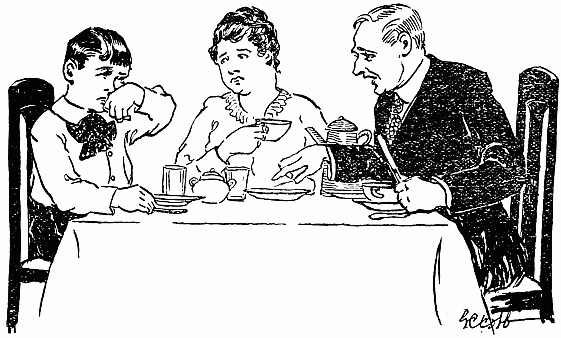

[64]
Show Me
There is a dame I know you know,
Who'll make big talk, will brag and blow
About the waffles that she makes,
Also her corn and buckwheat cakes—
But always my cake's dough.
She tells of this or that one who
At breakfast, once ate twenty-two!
And when she feared that he would bust
He raved and railed and almost cussed,
And said he wa'n't half through.
I've hinted and I've begged this dame
To just for once treat me the same.
But always she the question begs,
Or's out of cream, or maybe eggs,
Or some excuse as lame.
Yet here am I, so thin and pale,
While she, dear soul, is plump and hale.
If she's the best cook in the South,
Why let me stand with watering mouth?—
She should be sent to jail!
Now, I'm from out Missouri way,
Where "Please show me," is what they say.
I'm hungry and too weak to walk,
So "Please feed me, or stop your talk!"
[65]I'll tell her this today.
A pawfull and a mawfull I
Must have or else I fear I'll die.
Her talk does naught but aggravate;
It does not help my famished state
Nor hunger satisfy.
Unless I get a waffle quick,
Unless I get it awful quick,
I'd better beat her up, I guess,
And mar her beauty more or less—
Unless I get it quick!
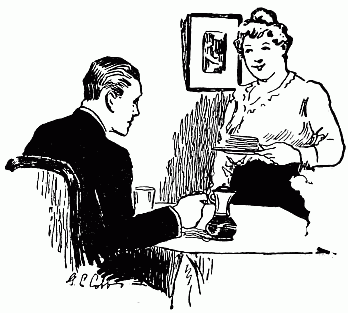

[66]
Damfino Jones
Damfino Jones, a mental drone,
Had no opinion of his own;
He grew to manhood meek and mild,
But he was Indecision's child,
It was the same in weal or woe:
He "wasn't sure," or "didn't know."
In business he would hesitate
To buy or sell until too late;
So, naturally he ran in debt—
But hasn't run back out as yet.
When asked when he a debt would pay
He "couldn't just exactly say."
In romance he just "couldn't just exactly say."
If he loved Blanche or Isabel—
He married Jane, and, safe to say,
'Twas she who kept the wolf at bay.
And with religion, mixed he got
When asked if orthodox or not.
In politics he'd weigh and weigh,
And then not vote on 'lection day.
And so he wavered till he died
And never did one thing decide.
Now I don't know, but it is said
[67]He isn't now quite sure he's dead.
Take note of men who've made success:
They tell you "No" or tell you "Yes"
Right off the bat, nor step aside
When faced with questions to decide;
While men like Jones just paw the air
And never do get anywhere.
This truth shines out like bright new tin:
Think for yourself if you would win.

[68]
Silent Bill
I have a friend called "Silent Bill,"
Aged ten, so says the Bible;
To me, in years, no word he's said—
Strange truth and not base libel.
He seems quite bright, and sees and hears—
In fact you'd think him normal;
But not a sound comes from his lips,
Not e'en to greeting formal.
When he's at home, so I am told,
It's talk, talk, talk, and chatter;
When I'm around, why is he dumb?
Explain, what is the matter?
Am I an ogre fierce and wild
With looks and mien ferocious
That cause to cling unto its roof
The tongue of this precocious?
"Oh, no!" says he, "you're not to blame."
(The answer comes by proxy.)
"The fault's not yours, but all guilt lies
With my dear mother, foxy.
I'd like to talk of lots of things—
But ain't my ma the limit?
She starts her tongue—so what's the use?
[69]I'm out, 'less I butt-in it."
"It's 'seen not heard,' so I've been told,
Or else a strapping vi'lent.
I fear the gad, and that's why I
Remain still Bill-the-silent.
Now, when you scrap about her size
I'm mum, but try to figger
How she could squeeze in through the door
If she were any bigger."
"But when she twits you 'bout the thatch
You've lost from off your attic,
I'd like to reprimand her then
In language quite emphatic.
I've waited long and ground my teeth,
And frowned upon her patter;
But I'm convinced she'll ne'er run down—
She's stuffed with ceaseless chatter."
——————
Dear Silent Bill, stay silent still;
To change, pray do not bother;
You're dearer far just as you are;
I'd true not have you other.
[70]
Buster Boy
The Jumbler, like Foss, loses a boy.
I have a friend called "Buster"—
A little child last Fall—
But now he's grown so very big
I scarce know him at all.
Almost a man! His folks are proud
And fairly beam with joy;
But I—I feel I'd rather cry;
For I—I've lost my boy.
No more he'll perch upon my knee
And ask me to relate
How Li Chi Fair and Chang-the-Good
Were saved from saddest fate.
And Jelly Jar and Big Black Bear
He'll treat with sneering scorn
And say, "Now please do stop and think
How long since I was born."
Time flies so fast it takes my breath!
Soon he'll forget it all—
The rhymes we wrote, the games we played,
None, none will he recall.
The world may praise him as a MAN—
God knows I wish him joy—
But I—I'll brush away a tear
And long for Buster Boy.
[71]
Not Forgetting Dad
A new kid's come to our house;
A peach, I'm here to tell;
And things are topsy-turvy like—
Still—Father's doing well!
'Twas 3 A. M. this morning
That it began to squall;
Some neighbors got excited—
But Dad wa'n't feased at all.
Twas—oh, yes, quite expected—
And welcome, I opine;
And bibs and socks and—things are made,
[72]And—Daddy's feeling fine!
Another Christmas present!
Gee, that's hard luck for fair!
The Old Man says, "Mere bagatelle,
Why should a fawther care?"
How's Mother? Oh, she's so-so!
The Kid? Well, it will do.
Of Papa we are glad to state
That he will sure pull through.
Then, here's a cheer for Mother;
One for the Kid we give;
Now ready—give a score of them:
Doc says that Pa will live!
[73]
Chromatic
We've got a nice red moo-cow-moo,
But doesn't seem just right.
She eats green grass the whole day through
Then gives us milk that's white.
"Red cows, when on blue-grass are fed,
Give white milk." Is this true?
I am so green, when this I read
It straightway made me blue.
A Flare Back:
We also, have a moo-cow-moo.
She isn't red, but black;
The milk she gives, it isn't white,
But blue,—alas, alack!
Methinks that you'd be black and blue
Had you your due, young fellow;
But matters not the shade or hue,
Just so you're never yellow!
[74]
Enuf!
When "dis ol' waggin am done broke down,"
I feel 'twould be a sin
To hold your love through Pity's sake
For what I once had been.
"Yours till death!" is what they say;
But isn't it enough
To say, "Dear Girl, I sure am yours
Until the wheels fall off?"
[75]
And here the Jumbler entertains the children with a
few Nursery rhymes:
| The Evening Bath (Apartment Next Door). |
| The Dirty-Neck Policeman and the Black-Hand. |
| Do You Believe in Santa Claus? |
| Shaving Time. |
| The Big Black Bear. |
[76]
The Evening Bath
(Apartment Next Door).
I try to read—but really, what's the use?
You'd think, I swear, 'twas Bedlam broken loose;
A scream! And then I hear, "Oh mercy! Ouch! My ear!
I surely cannot stand all this abuse!
You're gouging me and pulling out my hair;
My skin's rubbed off—'tis more than I can bear!
Now really you're not heeding or you'd see my nose is bleeding!
I believe you would kill me if you dared!"
I jump up from my chair and grab my gun;
I must be quick or murder will be done;
I rush across the hall and loudly 'gin to call:
"Unnatural parent, wouldst thou slay thy son?",
Upon the door I then begin to beat,
And straightway hear the scamper of bare feet;
Then "Mother" stood and laughed, said, "Surely you've gone daft—
I'm only giving them their evening bath."
She calmed herself and then she sweetly said,
"I always scrub 'em 'fore they go to bed;
[77]But don't see why my daughter should have such fear of water;
And Buster,—why, it simply drives him mad!
I really don't see what I'm going to do,
Despite the fact it greatly worries you;
Of course it may seem mean but I'm going to keep them clean—
And I don't know how unless I scrub 'em down."
——————
So "Cleanliness is next to Godliness!"
It may be so; but really I confess
I'd let them go as black as night and look just like an awful fright—
Unless the Gold Dust Twins'd do the work.
What matter, pray, if streaks run 'round the neck
And dirt be under nails, about a peck?
I'd rather, oh, yes, quite, that they were black than white—
If I disturbed the town when bathing them.
[78]
The Dirty-Neck Policeman and the Black Hand
Oh, run! Oh, mercy, run! you little children,
Just as fast and quickly as you can!
For here comes the Dirty-Neck Policeman,
And I'm sure I see the Black-Hand man.
So, scrub, scrub, scrub your little hannies,
And your necks, pray don't forget them, dears;
These men will surely get you if you're dirty;
They'll pay no attention to your tears.
The Dirty-neck Policeman he jes' grabs you,
And if he finds your neck's not clean and white,
He carries you away in spite of begging,
And keeps you from your mother all that night!
Next day his ugly wife gets soap and water,
And scrubs you with a great big curry-comb;
And if you cry she fills your mouth with soap-suds,
Till you promise you will keep clean when you get home.
[79]
The Black-hand Man keeps hidin' 'round the corner,
A-lookin' at your knuckles and your nails;
And if they're dirty he jes' rushes at you
And grabs you with a hook—he never fails!
And then he sits down on you when he's caught you,
Sandpapers you until you're bleedin', My!
And he jes' laughs and chuckles while he's working,
And rubs you all the harder if you cry!
So it's best to keep quite clean, or you'll be sorry;
You never know just when you may get caught;
The Dirty-neck Policeman's mighty watchful,
And the Black-hand Man's a-hidin' 'round a lot!
[80]
Do You Believe in Santa Claus?
"Aw, youse kids make me orful tired,
Talkin' 'bout Sandy Claws!
Huh! Don'tcher know he's jest a fake,
And nothin' 'cept our pas?
"When your ma tells you all this rot,
Don't believe her no more;
Get wise! I've watched and seen pa work—
Dere bluffin' makes me sore."
"O Jim! You shouldn't say such things!"
The rest intreated him,
"For if you do you'll make him mad,
And he'll forget you, Jim."
"Of course Old Santa's sure-nuff true,
An' comes 'round every year
An' brings you things, if you are good—
We think him just a dear.
"The fairies, you'll be saying next,
Are make-believes also.
Just 'cause you're tough (our mas say so)
Is no sign that you know."
Well, Christmas morning came, and Jim
His stockings rushed to see.
He took one look and then he cried,
[81]"They're empty as can be!"
But then he found, by hunting 'round,
A suit of underwear,
A tooth-brush and a handkerchief
Upon a kitchen chair.
He cried and cried and then ran out—
Was anxious so to see
If others in the neighborhood
Had fared the same as he.
But Mary had a baby doll,
And Jamie had a sled;
Virginia had some roller skates,
An air-gun had small Fred.
Besides, much candy they all had,
And lots and lots of toys
And things that Santa always brings
To real good girls and boys.
"Now fellers, w'at's the answer, say?
I'm mad enough to swear!
I
needed skates—why did I
get
A suit of underwear?
"It seems that you-uns ev'ry one
Has got most everything
That you have said for weeks you hoped
That Sandy Claws would bring."
——————
The answer is, dear children:
Old Santa Claus don't doubt.
For if you do—the truth I tell—
Like Jim, you'll be left out!
[82]
Shaving Time
When Dad gets out his safety
The family 'gin to quake;
They huddle 'round the doorway,
Nor dare the silence break.
When Dad gets out his safety,
A hush falls on the air
And Fido runs to hide him
Beneath a friendly chair.
Then Ma, she tiptoes gently
To fetch him water hot,
And lest he want for towels
She lays him out a lot.
One of us goes for talcum,
And one for shaving soap;
Another gets witch hazel,
Cold cream and smelly dope.
Then we withdraw us quickly
And watch him from afar;
A safety's mighty dang'rous—
[83]It wouldn't do to jar.
With face all white and soapy
He scrapes his cheeks and chin;
The way he frowns and winces
It surely hurts like sin.
But when the job is over
And Dad looks clean and young,
We all resume our breathing,
And songs of praise are sung.
As Dad cleans up his safety
You ought to see him strut
And brag about how easy 'tis
His face to never cut.
When Dad's put 'way his safety
He laughs with fiendish glee
To think the grasping barber
From him will get no fee.
But ev'ry silver lining
Has dark clouds lurking near:
Tomorrow morn Dad's safety
Brings back our hour of fear.

[84]
The Big Black Bear
Come, bear with me, I'll tell to you
Of Big Black Bears with children two;
Of Father Bear, too ready to dare,
And Mother, and the cross she bare.
'Twas "Cinnabar" and "Blackberry" that Pa Bear his children named;
But simply "Bairns" was nicer far, the mother stoutly claimed.
A lively time these children had, of pleasures had no lack;
The thing that tickled them the most was bareback pick-a-pack.
This man Bear was, oh! so wicked and sly,
He'd steal and then tell you a barefaced lie;
The older he grew the more he would fight—
Stuck on himself 'cause he could read and write.
This Big Black Bear was a grouchy bear,
And a cross old bear was he;
He snapped and clawed and bristled and pawed
And growled ferociously!
This Big Black Bear broke open the door
And walked right into the groc'ry store;
He ate all the sugar, he ate all the ham,
And left not a cent for the groc'ryman.
He wrapped up honey and choice candies
And he then left a note: "Just charge 'em, please;
I'm gaunt and sore, I've come a distance,
[85]And take enough for bare existence."
The grocer, next morn, collected some men
And tracked the foot-prints right up to the den;
The Cubs, when they came, were out all alone,
But raced through cubbyholes cut in the stone.
The Bears laid low, kept out of sight,
Cubs snuggled down like it was night.
"All right," said the men, "we'll sure get you yet!"
And then went to work a big trap to set.
They got it all fixed and placed on the ground,
And then lots of honey scattered around;
And then, lest some traveler its sight should miss,
They nailed up a sign that looked just like this:
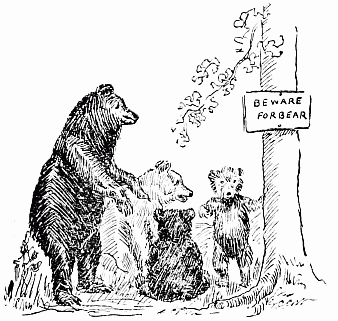
As soon as they had gone quite a while
Old Pa Bear sneaked out, then called with a smile;
"Come out, hustle up, there's nothing to fear;
There's honey enough for all of us here!"
[86]"To me," says Ma, "this thing spells ruin;
I feel that there is trouble brewin'!"
"Tut, tut!" says Pa, "just like a fool!
'Tis plain you never went to school.
If you could read you'd plainly see
That this was sent a gift to me.
'Bee-ware' is honey, surely you know;
And 'For-Bear' is what it says below.
Now cubbies, you see how much you need
To learn right soon to write and to read.
So study real hard, become a power—
A Cub reporter, some day, or maybe the bar."
"Dip in," said he, "la, la it's swell!"
And then let out an awful yell!!——
For the trap had sprung and caught him fair——
The fam'ly quickly ran to the lair.
Then ping!! crack!! crack!! a loud report!!
"All in!" cried they, "Oh, my, what sport!"
They skinned him and carried away the dead;
But not a pall-bearer once bared his head.
On this Bear's sad end the grocer oft does gloat—
What's now left of Pa is a big winter coat.
When the weather's cold (not immodest nor sin)
The Grocer comes forth just in his bear skin.
The Cubs, thus bereft, were frightened quite,
They sobbed and they cried with all of their might.
"Come, Bairns," said Ma, "let's off to the wood;
I'll get you a new pa who'll do as Bears should."
She did it and made a most excellent wife,
And all are now living the happiest life.

[87]
Missing You
Impelled by lonesomeness, the Jumbler is inspired to this bit
of sentimental rhyme.
Feeling mighty lonely;
Yes, getting pow'ful blue;
Dearie, here's the answer:
I'm missing, missing you.
Rain beats 'gainst the window,
Or skies are bright and blue;
Doesn't seem to matter—
I'm missing, missing you.
Days are long and tiresome,
And nights seem endless, too;
Slumber is a stranger—
I'm missing, missing you.
Writing rhyme is easy,
'Bout all that I can do;
Ev'ry word in English
[88]Now wants to rhyme with You.
If I thought, my dearie,
That you missed me, too,
I should then be happy
In missing, missing you.
Joy lives close to Sadness,
The steps are short and few:
Changing just one letter
Makes "missing" "kissing" you.
INDEX
| | PAGE |
| Greetings | 9 |
| Introspection | 10 |
| An Acknowledgment | 11 |
| Pay! Pay!! Pay!! | 12 |
| Taffy and the Man | 13 |
| Myself vs. Me | 15 |
| To "The Quiet Observer" | 16 |
| A bas Polyanna | 18 |
| If You'd Marry | 19 |
| To My Valentine | 20 |
| All Mine in Dreams | 22 |
| Should Dreams Come True | 23 |
| Lotus Eating | 24 |
| Fergit Dem Dreams | 25 |
| Fickleness of Maidens | 28 |
| Constancy—As Applied to One Man | 29 |
| Handle With Care | 30 |
| The One and the Only | 31 |
| My Garden | 33 |
| My Threnody | 35 |
| Eternity | 36 |
| A Medley: |
| I, 'Ear, Noes | 38 |
| Ode to a Sylphine Figure | 38 |
| Feelin' Blue | 39 |
| A Bare Story | 39 |
| A Truth | 40 |
| Hooverize | 40 |
| Fine | 40 |
| Fugax, Sequax; Sequax, Fugax | 41 |
| A Betrayal of Irish Ancestry | 41 |
| Exit Cooky | 41 |
| The Limit | 41 |
| Safety First | 42 |
| Unbearable | 42 |
| Wrong Prescription | 42 |
| Seeing Double | 43 |
| Wisdom | 43 |
| Just Talk | 44 |
| The Man Who Made Umph-ta-ta Smile | 46 |
| Myself and Me | 49 |
| C'est la Guerre | 50 |
| Spring Styles | 51 |
| Strictly Proper | 53 |
| 18 to 45 | 56 |
| You Never Can Tell | 58 |
| An Ounce of Prevention | 59 |
| Fear Not | 61 |
| Eat What's Set Before You | 62 |
| Show Me | 64 |
| Damfino Jones | 66 |
| Silent Bill | 68 |
| Buster Boy | 70 |
| Not Forgetting Dad | 71 |
| Chromatic | 73 |
| Enuf! | 74 |
| The Evening Bath | 76 |
| The Dirty-Neck Policeman and the Black Hand | 78 |
| Do You Believe in Santa Claus? | 80 |
| Shaving Time | 82 |
| The Big Black Bear | 84 |
| Missing You | 87 |

Transcriber's Notes:
Varied hyphenation was retained except where noted below, for example, "Black Hand" and "Black-Hand"
which appears twice in each form. Obvious punctuation errors repaired.
Page 38, "litsen" changed to "listen" (an ear and listen)
Page 70, line "None, none will he recall." was indented to match rest of
poem's layout.
Index, hyphen added to "Dirty-Neck" to match the text's usage (The Dirty-Neck
Policeman)
*** END OF THE PROJECT GUTENBERG EBOOK 42392 ***


